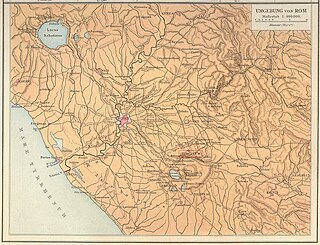This article concerns the period 439 BC – 430 BC.
Year 460 BC was a year of the pre-Julian Roman calendar. At the time, it was known as the Year of the Consulship of Poplicola and Sabinus. The denomination 460 BC for this year has been used since the early medieval period, when the Anno Domini calendar era became the prevalent method in Europe for naming years.

Lucius Quinctius Cincinnatus was a Roman patrician, statesman, and military leader of the early Roman Republic who became a legendary figure of Roman virtue—particularly civic virtue—by the time of the late Republic.

Gaius Servilius Ahala was a 5th-century BC politician of ancient Rome, considered by many later writers to have been a hero. His fame rested on the contention that he saved Rome from Spurius Maelius in 439 BC by killing him with a dagger concealed under an armpit. This may be less historical fact and more etiological myth, invented to explain the Servilian cognomen "Ahala"/"Axilla", which means "armpit" and is probably of Etruscan origin.
Lucius Sextius Sextinus Lateranus was a Roman tribune of the plebs and is noted for having been one of two men who passed the Leges Liciniae Sextiae of 368 BC and 367 BC. Originally, these were a set of three laws. One law provided that the interest already paid on debts should be deducted from the principal and that the payment of the rest of the principal should be in three equal annual installments. Another one provided restricted individual ownership of public land in excess of 500 iugeras and forbade the grazing of more than 100 cattle on public land. The most important law provided that one of the two consuls be a plebeian. Having been reelected nine times, Lucius Sextius Lateranus and Gaius Licinius Stolo held the plebeian tribunate for ten years. In 368 BC the laws regarding debt and land were passed, but the law regarding the consulship was rejected. In 367 BC this law was passed. In the same year the two tribunes of the plebs proposed a fourth law concerning the priests who were the custodians of the sacred Sibylline Books, and Lucius Sextius Lateranus was elected to serve as consul for the year 366 BC. Livy wrote that he was "the first of the plebeians to attain that honour."

The Battle of Mount Algidus was fought in 458 BC, between the Roman Republic and the Aequi, near Mount Algidus in Latium. The Roman dictator Lucius Quinctius Cincinnatus turned an expected Roman defeat into an important victory.

Lucius Minucius Esquilinus Augurinus was a Roman politician in the 5th century BC, consul in 458 BC, and decemvir in 450 BC.

The gens Quinctia, sometimes written Quintia, was a patrician family at ancient Rome. Throughout the history of the Republic, its members often held the highest offices of the state, and it produced some men of importance even during the imperial period. For the first forty years after the expulsion of the kings the Quinctii are not mentioned, and the first of the gens who obtained the consulship was Titus Quinctius Capitolinus Barbatus in 471 BC; but from that year their name constantly appears in the Fasti consulares.
Spurius Maelius was a wealthy Roman plebeian who was slain because he was suspected of intending to make himself king.
Lucius Furius Medullinus, of the patrician gens Furia, was a politician and general of the Roman Republic who was consul twice and Consular Tribune seven times.
Titus Quinctius Capitolinus Barbatus was a Roman statesman and general who served as consul six times. Titus Quinctius was a member of the gens Quinctia, one of the oldest patrician families in Rome.
Lucius Julius Iullus was a member of the ancient patrician gens Julia. He was one of the consular tribunes of 438 BC, magister equitum in 431, and consul in 430 BC.
Gaius Julius Iullus was a Roman statesman and member of the ancient patrician gens Julia. He was consular tribune in 408 and 405 BC, and censor in 393.
Lucius Julius L. f Vop. n. Iulus was a member of the patrician house of the Julii at ancient Rome. He was military tribune with consular powers in 401 and 397 BC.
Lucius Julius Iulus was a member of the ancient patrician house of the Julii. He held the office of military tribune with consular powers in 388 BC, and again in 379.
Gaius Claudius Ap. f. M. n. Sabinus Regillensis, was a member of the great patrician house of the Claudii at Ancient Rome. He held the consulship in 460 BC.
The gens Maelia was a plebeian family at ancient Rome. Members of this gens are mentioned in the time of the early Republic, from just after the decemvirs down to the Samnite Wars. The Maelii belonged to the equestrian order, and were among the wealthiest of the plebeians. The most famous of the Maelii was probably Spurius Maelius, a wealthy merchant who purchased grain from the Etruscans during a famine in 440 BC, and sold it to the poor at a nominal price. The following year, the patricians accused him of conspiring to make himself king, and when he resisted arrest he was slain by the magister equitum, Gaius Servilius Ahala.
Lucius Furius Medullinus was a Roman politician active during the 5th century BC, and was consular tribune in 432, 425, and 420 BC.
Agrippa Menenius Lanatus was consul of the Roman Republic in 439 BC and possibly the consular tribune of 419 and 417 BC.
Lucius Lucretius Tricipitinus Flavus was a Roman statesman and general who had a prominent career in the early 4th century BC, serving once as consul, and four times as consular tribune, as well as perhaps serving as Princeps senatus.




